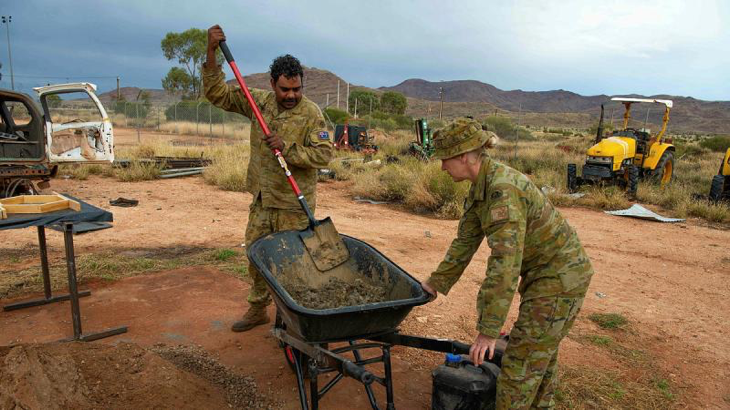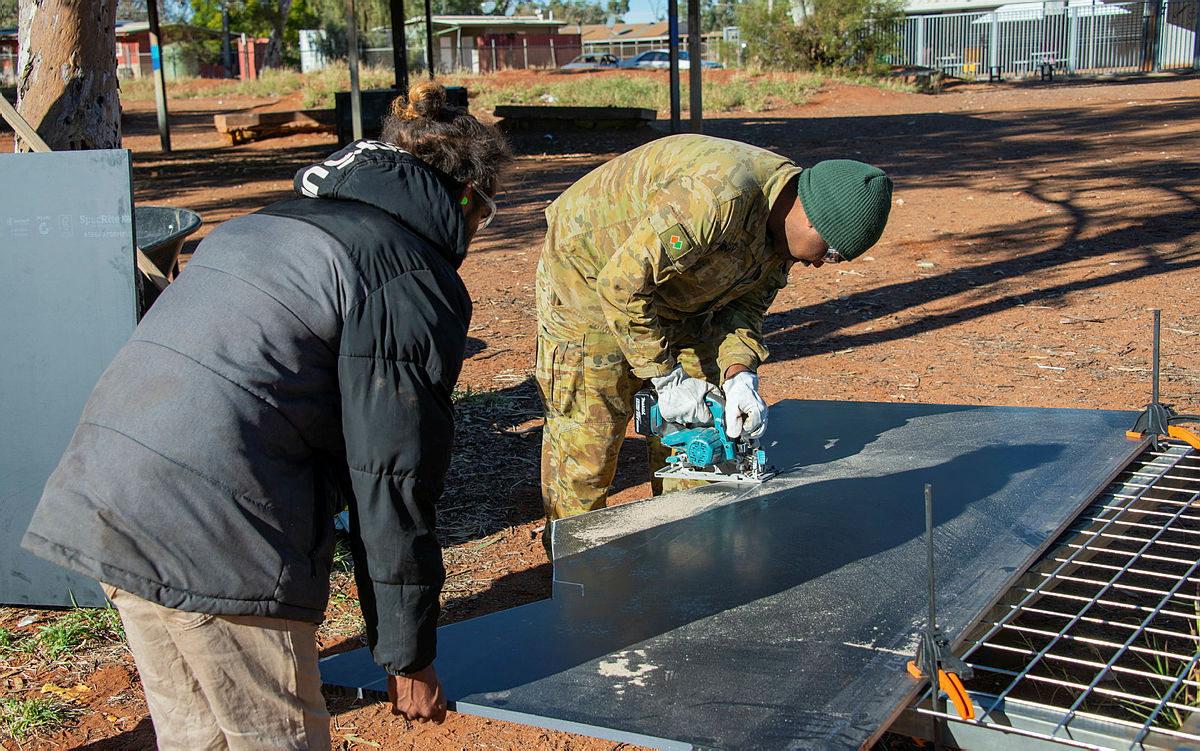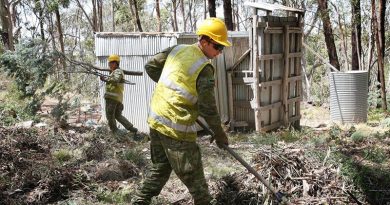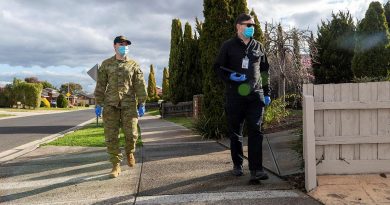Soldier supporting his own community

Anangu man Private Luke Kennedy is living a once-in-a-lifetime experience.
CAPTION: Private Luke Kennedy and Captain Debra Johnson mix cement to create tiles for the Amata Anangu School in remote north-western South Australia. Story by Major Evita Ryan. Photos by Corporal Michael Cassidy.
When he enlisted as a part-time soldier and posted to the North West Mobile Force (NORFORCE) in April 2021, he had no way of knowing that a 100-member Army contingent would be living and working alongside his remote First Nations community three years later.
“My cousin Kamurin works for NORFORCE and he told his boss in Alice Springs that I was interested in joining Army,” Private Kennedy said.
“I wanted to join Army when I was in school but I got busy doing other different jobs.
“Kamurin spoke to his boss and I went around and signed the application in Alice Springs.”
At the time, Private Kennedy was also a police officer with the Northern Territory Police Force, based at Alice Springs.
Keen to return to his homeland, Private Kennedy resigned from the police force after two years working in Mutitjulu, near Uluru.
“I decided to resign and come back home because I didn’t have much leave. I was using the leave I had for men’s ceremony and all that,” he said.
Now Private Kennedy is helping to deliver on-the-job training and mentoring as part of the Army Aboriginal Community Assistance Programme (AACAP) to help support pathways for community members in his hometown of Amata.
As one of the larger First Nations communities within the remote Anangu Pitjantjatjara Yankunytjatjara (APY) lands in the northwest corner of South Australia, Amata is nestled at the western end of the Musgrave Ranges straddling the South Australian and the Northern Territory boundary.
“I’m proud to be working with Army for six months and the community is enjoying having Army here,” Private Kennedy said.
“When we first started I helped put up all the tents and walkways at Camp Birt,” Private Kennedy said, referring to the home of the AACAP 2024 contingent.
“It’s a good camp in the desert.”
As part of the AACAP team, Private Kennedy has been assisting participants with basic plumbing, welding and carpentry.
“I’ve been helping in the workshop where the students are learning welding and cutting. The students describe what they want and Stewie and the sergeant help them make it,” Private Kennedy said, referring to Sapper Malcolm Stewart and Sergeant Richard Mathews.
Having enjoyed learning with NORFORCE in Alice Springs and in Darwin during the past three years, Private Kennedy is grateful to be developing new skills during AACAP 2024.
“My favourite thing to do is shooting, so with NORFORCE I’ve enjoyed using Army’s weapons, night shooting with NVGs, driving Army vehicles and learning more and doing some fun stuff,” he said.
Keen to share his culture and knowledge of his homeland, Private Kennedy is planning a two-night camping trip that will involve hiking from the other side of the Musgrave Ranges into the Amata township.
“We’ll take some of the AACAP fellas hiking,” Private Kennedy said.
“We’ll walk from the other side of the mountain across, teaching storytelling as we walk.
“You can see Uluru from up there and get three or four bars of reception.
“We did it in 2015 when we didn’t have mobile reception in [the] community. I called my grandfather from up there ’cause he was working at the clinic and I rang him on the clinic’s phone.
“We also took a broken mirror with us and the community could see us shining the mirror from up there.”
CAPTION: Private Luke Kennedy, right, reconstructs a park bench with a fellow Amata community member.
While Private Kennedy is enjoying working almost full-time with AACAP in Amata, he is waiting to attend training with the South Australian Police Force so he can work as a police officer in his hometown.
“I want to be a police officer here in Amata because I understand my language very well,” Private Kennedy said.
“Some people don’t tell the police the right story and then innocent people get locked up.
“Sometimes they lie, but sometimes it’s the language barrier.”
.
.

.
.






